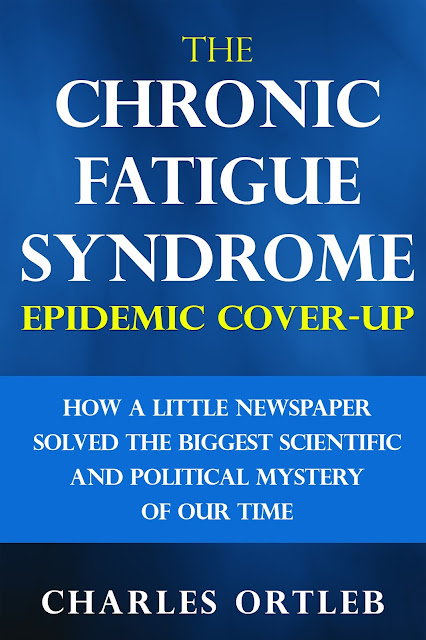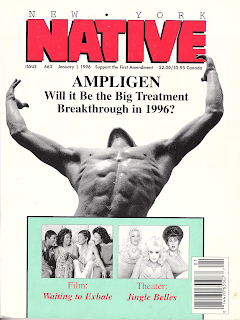How Anthony Fauci was able to keep control of the AIDS narrative that covered up the Chronic Fatigue Syndrome epidemic.
From an interview with Anthony Fauci
https://history.nih.gov/nihinownwords/docs/fauci3_06.html
Harden: We all remember that George Bush, when asked to name an American
hero, named Dr. Anthony Fauci and thus brought honor to you, to the NIH,
and, by extension, to all biomedical scientists and physicians. He also
invited you to the White House and put some pressure, I believe, on you
to accept the NIH directorship. Do you want to talk about that?
Fauci: I was very flattered and surprised that he listed me as one of
his heroes. I knew him pretty well at that point. I was very gratified
and pleased. I did not hear the Presidential debate in which he called
me his hero. I had been on a trip, and as I walked into the elevator at
the NIH when I came back, people said, “You must feel terrific.”
I said, “What happened? What are you talking about?” I finally
got to my office and they told me about it.
With regard to the NIH directorship, I am very grateful to President
Bush for understanding why I did not want to be NIH Director. I wrote
to him early on when my name was being sent down to the President from
the Secretary as the top choice for the NIH Director's job. I wrote to
President Bush when he went up to Kennebunkport [Maine], and I sent him
a message through some people I knew at the White House that I was going
to turn the offer down. I wanted him to understand that it had nothing
to do with my admiration for, and friendship with, him. It is not an easy
thing to say no to a President who offers you such a prestigious job.
But I explained to him the reasons why I wanted to turn it down, which
were my science and my commitment to AIDS and to the NIAID.
Bush wrote me a beautiful letter back saying that his respect and admiration
for me was even increased by understanding how devoted I was to the cause,
and that he was looking forward to continuing to work with me. I was afraid
that he would say, “Get out of here. You are insulting me by not
saying yes.” That was the first time. The second time was even more
anxiety provoking. [Dr.] Jim [James] Mason, the Assistant Secretary [for
HHS], asked me if I wanted to take the job. This was after I had written
to the President and said no the first time. Several months went by and
we still did not have a Director at NIH following the departure of Jim
Wyngaarden. Jim Mason asked me if I wanted the job, and I said I did not
for the same reasons as before. People thought that it was because of
the fetal tissue issue. It had nothing to do with fetal tissue. No one
ever made any conditions to me about fetal tissue. That never even came
up in the conversation. It was purely my not wanting to be in any way
dissociated from my laboratory, my science, and the AIDS research at the
NIAID. Jim Mason said, “You will have to say no to somebody higher
than me.” I said, “Jim, don't do this to me.” He said,
“You will have to talk to Lou Sullivan.” Secretary Louis Sullivan
called and said “Tony, what do you think? Would you like to do it?”
I said, “Lou, I do not want to do it. Please do not put me in a position
to create any embarrassment.” He said, “All right. Fine.”
About a week, two weeks, went by and Lou got on the phone and said, “We
are going to the White House.” I replied, “Oh my goodness, what
are you doing to me?” He said, “I am sorry, Tony. You are going
to have to say no to the President. We have spoken to [John] Sununu, and
we have spoken to the domestic policy people. They do not think you are
going to say no to the President.”
I remember that I went into the White House and I was waiting outside
the Oval Office. John Sununu came over to me and said, “You are not
going to say no to the President, are you?” I said, “Governor,
I am very sorry, but I am going have to do it, because nothing has changed.
I think that the President will understand that.” He said, “But
nobody says no to the President in the Oval Office.” I said, “Well,
I do not think it is a macho thing to do. I am just very uncomfortable
about being here. I am only here because Lou Sullivan asked me to be here.”
I figured this was the end. This would really get the President upset.
I walked into the Oval Office and sat down next to the President, who
said, “Well, Tony, do you want to revisit this?” I replied,
“Mr. President, everything I said before goes in spades. I have a
great deal of admiration for you. I am very proud to serve in your administration.
But what I do best is what I am doing now. I think I would contribute
more to you and to the country if, in fact, I were able to continue my
job.”
I told the President that the same reasons governed my thinking as when
I had spoken and written to him the previous time. I wanted to stay very
closely involved with the science. He paused for a moment, and he looked
at me. Then he said, “Is there anything that we can do to create
a situation where you would want to do the job? How about if you do it
for two years then you go back to being the Director of NIAID? Or we will
give you enough administrative help that you could continue to run your
laboratory and you could continue to do the AIDS research? You can do
anything you want, AIDS, laboratory, OAR [Office of AIDS Research], everything
you want to do.” I said, “Mr. President, this is very painful
for me, but, with all due respect, I will serve you much better if I stay
where I am.”
I thought, “This is the end. I have tried the man's patience.”
But Bush is such a wonderful human being that he looked up at me and said,
“Tony, once again I keep having more and more admiration for you.
Good luck to you. If there is anything I can do to help you, just give
me a call.” And he actually gave to me his secretary's private number.
“Just call me. I want to talk to you right up front if you have anything
that I can help you with.”
I figured that he was just saying that and that now he would be angry
with me. As we walked out of the Oval Office, Governor Sununu said to
me. “I cannot believe you did that.” Sununu was not upset with
me. He was actually very friendly. I had good relations with him too.
That was it. After a while, I guess it was a few weeks to a month, I
thought that this would be it because Bush would go off and find someone
else who would be his favorite medical person, as it were. But, sure enough,
he gave me a call about a month later and asked me a question that was
of some importance. Then, two months later, he invited me to the White
House for a small dinner so we continued our friendship. I have always
felt very fortunate that I was able to act the way I believed I should
act, namely, turn the President down, without having him feel that I was
turning him down personally. As it turned out, it served to make our relationship
even stronger right up until the end of his presidency. I hope it will
continue even now if I get the opportunity to deal with him.
Is Anthony Fauci the Bernie Madoff of AIDS? Listen to this podcast and read The Chronic Fatigue Syndrome Epidemic Cover-up Volume Two.
Read about the disaster Anthony Fauci created in The Chronic Fatigue Syndrome Epidemic Cover-up Volume Two.













